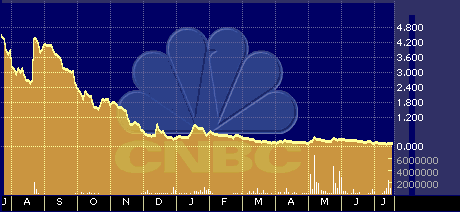
OPUS360 Shares Jump After IPO
OPUS360 Shares Jump After IPO
By Hal Plotkin
Silicon Valley Correspondent
Analysts say business-to-business professional services company OPUS360 Corp. {OPUS}, whose shares began trading publicly on Friday, is in the right place at the right time.
“They’re in an area that’s going to grow quite rapidly,” says Kazim Isfahani, senior analyst at the Giga Information Group, based in Norwalk, Conn. “As long as we have this labor shortage, three to five years at least, this is going to continue to grow.”

OPUS360 post-IPO stock performance
OPUS360 shares began trading at $13 Friday morning, up $3 from the $10 IPO price. In late-morning trading, they stood $2.82 higher at $12.82. The company has floated 7.7 million shares.
New York-based Opus360 operates the Freeagent.com Web site, an online professional-services exchange that matches independent consultants with firms looking for temporary contract help.
Analysts say OPUS360 has a good chance of riding the same wave that led Niku Corp. {NIKU} to a very splashy recent IPO. Redwood City, Calif.-based Niku provides an online service for the sourcing, management and delivery of professional services.
Niku went public on Feb. 28 with shares priced at $24. The stock more than quadrupled shortly after the IPO, before more falling back to about three times its offering price more recently.

Post-IPO chart for NIKU
On Monday, Dain Rauscher Wessels analyst Stephen Sigmond, based in Minneapolis initiated coverage of Niku with a “strong buy-speculative” rating and a 12-month price target of $125.
“Organizations increasingly need to operate in “Internet time” to effectively serve customers, to respond to competitive threats and develop new markets,” Sigmond wrote in a research report. “By using the Internet to collaborate and manage complex projects, professional-services organizations can better utilize and grow their distributed human assets, which directly impacts competitive advantage.”
Like Niku, OPUS360 generates revenue by administering and selling back-office services, such as project invoicing, expense reporting, group health insurance and a 401(k) plan, once the matches between buyers and sellers have been made. Sometime in the future, though, both operations hope to generate increasing revenue from project listing and transaction fees paid by firms that use their services.
“There’s definitely a huge need for what they’re doing,” says Michelle Pelino, an analyst with the Yankee Group in Boston. “As time goes by, there is going to be more and more of a need to put together teams of technically savvy people.”
There is also sure to be more and more competition, some of it potentially quite stiff.
Privately held Santa Clara, Calif.-based SkillsVillage Inc., for example, recently inked a marketing deal with PeopleSoft Inc. {PSFT} that will give PeopleSoft customers access to the approximately 20,000 consultants registered at the SkillsVillage.com Web site.
The competing OPUS360 Freeagent.com Web site, by contrast, claims more than 32,000 registered consultants. OPUS360 has a joint-marketing arrangement with Oxygen Media, Inc. aimed at making it a leading site for female consultants and knowledge workers. The company also has additional marketing alliances in the works.
Even so, Mike Boyd, an analyst at International Data Corp. based in Framingham, Mass., sees SkillsVillage Inc. as the clear early market leader, at least in the critical information-technology area the firm has targeted.
“SkillsVillage is positioned to really own the IT part of the market,” Boyd says. “Freeagent.com is more broad; they’re trying to cure world hunger.”
“That could be a problem for them over time,” Pelino says. “One of the things consultants and businesses might ask themselves in the future is if it makes more sense to go to the one place where they’re going to have more opportunities that are of interest to them. A less-focused site may not have the best ins. That’s one of the challenges if they get too broad.”
OPUS360 hopes to meet that challenge by offering co-branded or co-marketed professional matchmaking services in a variety of vertical niche markets.
Another speculative ingredient is the degree to which operations such as Freeagent.com and Niku will or won’t be able to amass useful and accurate information about the available consultants. The services might, for example, be in a position to let potential employers know the track record of individual consultants based on their performance on previous assignments.
“That could be plausible,” Boyd says. “But there’s a flip side. It’s very hard to get accurate references on potential new hires. No one ever wants to say anything bad. So you end up with everyone rated either average or above-average. And if these services do that, the consultants rated as average won’t come back. And the really good ones are never unemployed anyway. So there are some problems there.”
Boyd thinks online professional-services matchmakers will have better luck putting the power of the Internet to work to help identify the best teams that might be assembled to bring a project to completion, or by helping individual consultants partner with one another to bid on projects they would not be willing or able to tackle on their own.
The top 20 professional-staffing companies in the United States currently generate about $45 billion in revenue each year, according to IDC. Worldwide, that number is closer to $100 billion. The growing trend toward outsourcing is expected to further accelerate the market.
“Overall, I think there’s enough money there that anyone can make money on it,” Boyd says. “But there are lots of others that are also doing the same thing,” including, he says, traditional staffing agencies that are moving operations online and job-search and listing services, such as Monster.com, that may also develop similar services in the future.
“The key is going to be which of the sites do the best job and keep their users coming back,” Pelino says. “That’s something they still have to prove.”
OPUS360 posted a pro forma loss, including a still-pending acquisition, of $50.2 million on pro forma revenue of $2 million for 1999. The firm, which was founded in August 1998, had losses of about $1 million on no revenue during its first few months in operation.


